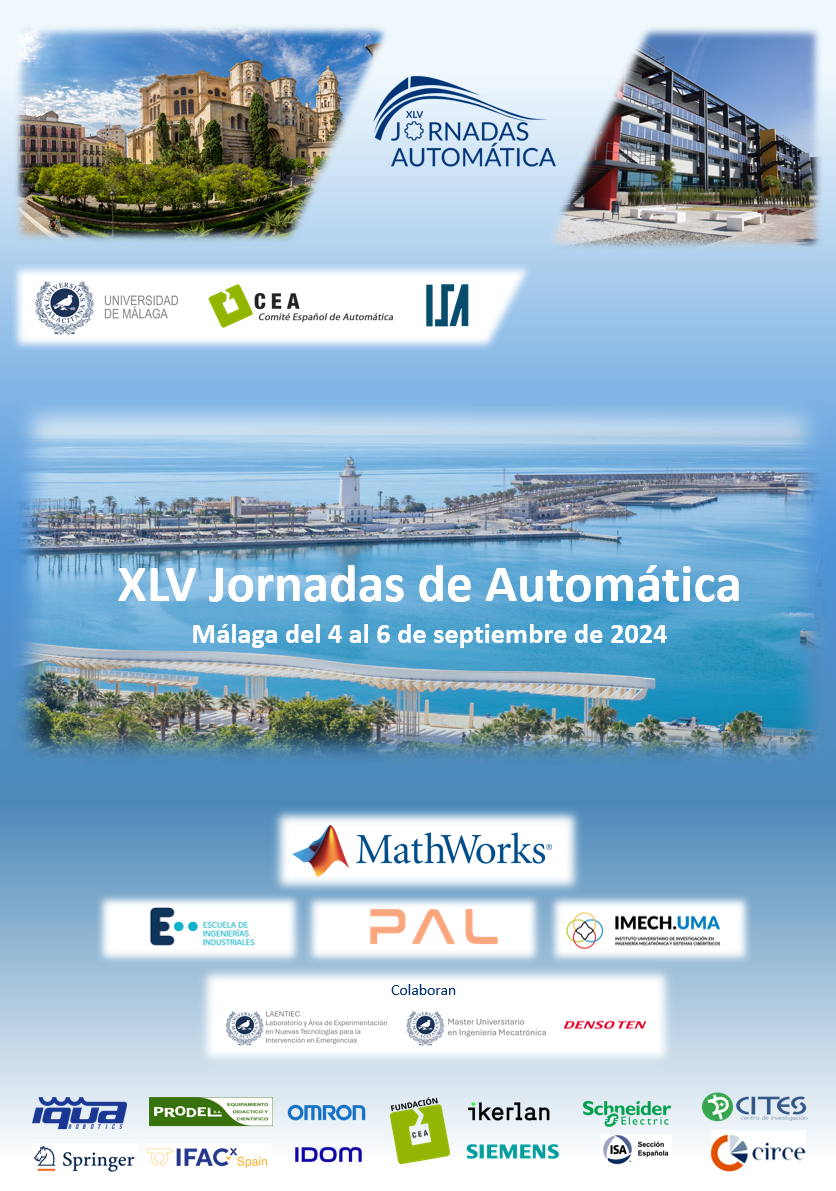Reescalado de un robot aéreo de ala batiente para vuelos en espacios limitados
DOI:
https://doi.org/10.17979/ja-cea.2024.45.10914Palabras clave:
Robots voladores, Diseño mecánico de vehículos aéreos, Sistemas robóticos autónomosResumen
Este artículo presenta el proceso de reescalado de un robot aéreo de ala batiente. El objetivo es diseñar una plataforma que permita volar de forma autónoma en espacios interiores y exteriores limitados. Se ha redimensionado un modelo previo de gran escala, haciendo más ligeras las distintas partes del robot. El diseño aerodinámico incluyó un nuevo perfil alar (S1221) que mejora la eficiencia aerodinámica. Además, se han realizado modificaciones significativas en el diseño mecánico y electrónico para reducir el peso, utilizando materiales más ligeros y componentes de menor tamaño. Los resultados preliminares indican que el prototipo cumple con los objetivos de peso y carga alar, lo que ofrece una buena maniobrabilidad.
Referencias
De Croon, G., 2020. Flapping wing drones show off their skills. Science Robotics 5 (44), eabd0233.
De Croon, G., De Clercq, K., Ruijsink, R., Remes, B., De Wagter, C., 2009. Design, aerodynamics, and vision-based control of the delfly. International Journal of Micro Air Vehicles 1 (2), 71–97.
Folkertsma, G. A., Straatman, W., Nijenhuis, N., Venner, C. H., Stramigioli, S., 2017. Robird: a robotic bird of prey. IEEE robotics & automation magazine 24 (3), 22–29.
Gayango, D., Salmoral, R., Romero, H., Carmona, J. M., Suarez, A., Ollero, A., 2023. Benchmark evaluation of hybrid fixed-flapping wing aerial robot with autopilot architecture for autonomous outdoor flight operations. IEEE Robotics and Automation Letters.
Gerdes, J., Holness, A., Perez-Rosado, A., Roberts, L., Greisinger, A., Barnett, E., Kempny, J., Lingam, D., Yeh, C.-H., Bruck, H. A., et al., 2014. Robo raven: a flapping-wing air vehicle with highly compliant and independently controlled wings. Soft Robotics 1 (4), 275–288.
Jafferis, N. T., Helbling, E. F., Karpelson, M., Wood, R. J., 2019. Untethered flight of an insect-sized flapping-wing microscale aerial vehicle. Nature 570 (7762), 491–495.
Jameel, A., Khalid, S., Khan, M., Kamal, K., Aqeel, A., Mathavan, S., Awais, T., Zafar, T., 2015. A bio inspired uav model based on corvus splendens. In: 2015 International Conference on Fluid Power and Mechatronics (FPM). IEEE, pp. 797–802.
Karásek, M., Muijres, F. T., De Wagter, C., Remes, B. D., De Croon, G. C., 2018. A tailless aerial robotic flapper reveals that flies use torque coupling in rapid banked turns. Science 361 (6407), 1089–1094.
Keennon, M., Klingebiel, K., Won, H., 2012. Development of the nano hummingbird: A tailless flapping wing micro air vehicle. In: 50th AIAA aerospace sciences meeting including the new horizons forum and aerospace exposition. p. 588.
Perez-Rosado, A., Bruck, H. A., Gupta, S. K., 2016. Integrating solar cells into flapping wing air vehicles for enhanced flight endurance. Journal of Mechanisms and Robotics 8 (5).
Phan, H. V., Aurecianus, S., Kang, T., Park, H. C., 2019. Kubeetle-s: An insect-like, tailless, hover-capable robot that can fly with a low-torque control mechanism. International Journal of Micro Air Vehicles 11, 1756829319861371.
Yang, W., Wang, L., Song, B., 2018. Dove: A biomimetic flapping-wing micro air vehicle. International Journal of Micro Air Vehicles 10 (1), 70–84.
Zufferey, R., Tormo-Barbero, J., Guzmán, M. M., Maldonado, F. J., Sanchez-Laulhe, E., Grau, P., Pérez, M., Acosta, J. Á., Ollero, A., 2021. Design of the high-payload flapping wing robot e-flap. IEEE Robotics and Automation Letters 6 (2), 3097–3104.
Descargas
Publicado
Número
Sección
Licencia
Derechos de autor 2024 Sara Coca, Pablo Crassous, Ernesto Sanchez-Laulhe, Raul Tapia, José Ramiro Martínez de Dios, Anibal Ollero

Esta obra está bajo una licencia internacional Creative Commons Atribución-NoComercial-CompartirIgual 4.0.





